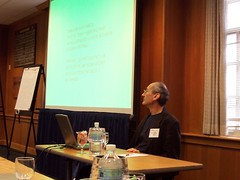Mood:
Notes by Christina Pikas

Data and slides available online and may be reused. There were slight technical difficulties.
Why do researchers publish?
Not for money but to communicate results
Open access is:
free, immediate, permanent, and full text online access
primarily peer reviewed journal articles, theses
Why?
Lawrence 2001, more citations to online articles than offline articles in the same venue (not open access effect)
To what extent were Lawrence's results only a CS effect? The compared OA vs. Non-OA in Astro
(he states that there are basically 12 astro journals, all astronomers are at institutions that cover these 12 at minimum, so to them there is open access) and other physics, sociology and biology.
http://opcit.eprints.org/oacitation-biblio.html
Lots of fast moving graphs here, based on a robot that gathered 1.4 million self-archived articles across about 10 fields (not phys, but does include some social sciences). Grouped articles by # of citations (in bins), then graphed for each bin, #articles for each pub year. Did the same for non-open access articles. Then took the ratio of one to the other, found (I believe and I think he'll correct me) that in general, open access articles are more highly cited across disciplines than non-open access articles.
Dollar value value of citation (a la Diamond 1986 and adjusted to current year money), $85/citation... The UK is losing 300k potential citations and 1.5B GBP based on the above calculations.
Research assessment, research funding, citation impact
All of the factors that are used to evaluate researchers and research groups.... correlate highly with citation counts. Citation counts would better highlight a really good article in a lesser journal.
Changing Citation Behavior
Peak of the curve is moving earlier and earlier. Citations may occur within 3 weeks of self-archiving (!) These charts come from citebase. Self-archiving has speeded up citation behavior, immediacy, and the movement of physics.
Open access - how?
Archives without an institutional self-archiving policy remain nearly empty.
What prevents us from open access in the form of self-archiving is keystrokes, not copyright
Awareness of author compliance (study?)
81% would willingly comply with self-archiving policy. 5 archives that have mandates are some of the largest (so this works) ... examples CERN, Southamption. University of Tasmania vs. Queensland productivity (?) +archives +librarian assistance +mandate ... (See upcoming D-lib article by Arthur Sale?)
388 institutional archives worldwide (they've found), vast majority are empty. In Germany every institution has an IR, but no policy (and sometimes no tender loving care)
Audience questions
a: Have the successful archives in the above mentioned Australian universities experienced citation effects?
a: early yet, but some
q: Infoglut or version control-
Will there be problems with too many versions... or access to the correct version
a: no, researchers just want the materials. researchers know what they're doing, what's a post-print, what's a pre-print, and what's good literature -- this is not done by librarians but is part of being a professional researcher
Robot -- didn't specify that articles were true OA, just that they were available online fulltext for free at the time of the crawl. Future work may try to address this
Q: about the wording of self-archiving... SH says that it's a supplement to subscription access.
Q: citation life cycle -- doesn't that bias this because articles might be self-archived only after they have proven to be good articles (I may have gotten this wrong sorry D.S.)
SH: they are studying latency, life cycle, immediacy
daser2005
Updated: 12/5 to add tag and picture, correctly spell the speakers first name.
Posted by asistdaser
at 9:56 AM EST
Updated: Monday, 5 December 2005 12:46 PM EST
